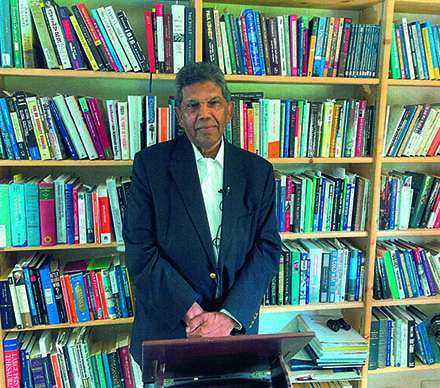By Dr Bertrand Ramcharan
Seventh Chancellor of the University of Guyana
Previously Fellow of Harvard University and of the LSE.
Henry Kissinger, in his book, On China, wrote that the Chinese have been shrewd practitioners of realpolitik and students of a strategic doctrine distinctly different from the strategy and diplomacy of the West. Chinese thinkers, he thought, developed strategic thought that placed a premium on victory through psychological advantage and preached the avoidance of direct conflict. What had distinguished Sun Tzu from Western writers on strategy was his emphasis on the psychological and political elements over the purely military ones.
China is a vast country with a population of some 1.3 billion, and containing over fifty ethnic nationalities. It considers itself under various security threats from within and without. It is determined to regain control of Taiwan, which the USA has historically asserted a right to protect. It has had to deal with manifestations of what it considers extremism and terrorism. It is determined to maintain the sovereignty and territorial integrity of the country and to ward off ‘splittists’.
China, having been the victim of imperial aggression in the nineteenth and twentieth centuries, set out, after the Communist revolution of 1949, to restore her dignity and that of her people, to advance their development and welfare, and to match the power of the Western hegemon, the United States of America. There were mistakes along the way, but, especially after the arrival of Deng Xiaoping as leader, China has made spectacular strides in growth and poverty reduction.
China attaches the highest importance to its national unity and the sovereign equality of states. As Chinese scholar Gao Feng has written:
“Five thousand years of ancient flourishing and the pain and humiliation of its modern history have decisively contributed to shaping China’s outlook on international law, particularly on the paramount role of state sovereignty and the principle of sovereign equality.”
What, we may ask, are Chinese conceptions of world order? In order to answer this question, we need to have an understanding of the foundations of world order. These include the following:
● The United Nations Charter and the legal obligations of Member States to comply with its provisions.
● The UN Declaration on Principles of International Law Concerning Friendly Relations and Cooperation among Nations.
● Rules of international law flowing from the sources of international law stated in Article 38 of the Statute of the International Court of Justice – which is an integral part of the UN Charter: treaties binding on States, customary international law, and general principles shared by the principal legal systems of the world. Pronouncements of the International Court of Justice help clarify the content of international law.
● Imperative norms of public international law (norms of jus cogens), which have recently been enumerated and reaffirmed by the UN International Law Commission.
● Binding Resolutions of the UN Security Council adopted under Chapter VII of the UN Charter.
Compliance with the rules of international law is at the core of the conception of an international order. How does China approach the issue of the international rule of law? The answer is one of ‘studied ambiguity.’ China, like the USA and some other countries, applies its own understanding of international law and gives international law its own interpretation. The USA does the same. Its courts apply American interpretations and judicial precedents of international law and the US Supreme Court rarely, if ever, entertains international precedents, such as judgments or opinions of the International Court of Justice.
In a major policy address at the United Nations in Geneva, in January, 2017, Chinese President Xi Jinping had the following to say on the international rule of law: “The relevance of law lies in its enforcement. It is thus incumbent on all member states to uphold the authority of the international rule of law, exercise their rights in accordance with the law, and fulfil their obligations in good faith. The relevance of law also lies in fairness and justice. All UN member states and international judicial institutions should ensure equal and uniform application of international law and reject double standards or selective application of international law, thus ensuring genuine equality and justice in the world.” One can see the nuances and the hedging here.
When it comes to the international law of human rights, China is a party to some international human rights conventions, but not of the International Covenant on Civil and Political Rights. It has submitted national reports to the UN and, broadly speaking, as we shall see below, pursues a development-oriented approach to human rights implementation.
The Chinese approach to the advancement of human dignity is a developmental one rather than a rights-oriented one. The strong hand of the Chinese government is felt in crucial areas such as the role of law, the judicial system, and the role of lawyers. China is tough on ‘dissidents’ and practises ‘re-education through labour camps’.
On the issue of the universality of human rights, China’s approach is one of formal acceptance in broad terms but of interpreting universality in the context of Chinese conditions. It is instructive to see the published views of the current Chinese judge on the International Court of Justice, Xue Hanquin, who is a former Chinese diplomat:
“China is of the view that the human rights cause should be promoted in line with each State’s social and economic development. China believes that as a social movement, human rights promotion should proceed in a gradual and incremental fashion. In principle, human right protection remains in relative terms for every country, subject to the level and degree of its development.
“While accepting universality and inseparability of human rights, China attaches importance to economic, social and cultural rights and the right to development in its human rights process. It shares the view that the essential task for most developed countries at this stage is first and foremost to pursue economic and social development. China accords precedence of economic and social rights over civil and political rights.
“China also emphasizes the correlation between the human rights cause and the rule of law. In promoting rights and freedoms China lays stress on duties and obligations of citizens under the rule of law.
“In promoting international protection of human rights, China advocates mutual respect, non-interference, non-confrontational and constructive dialogues. It opposes “the double standards practised against the developing world”.
Judge Hanquin expressed these views in her published lectures at the Hague Academy of International Law.
China is a strong and powerful country, with massive financial reserves. Its development bank and its Belt and Road Initiative provide large-scale financing to third world countries without human rights conditionalities.
As a prominent member of the UN Human Rights Council, China practices a policy of dialogue and cooperation over ‘confrontational policies’ by which it means condemning countries committing gross violations of human rights.
Overall, therefore, China’s approach is one of providing greater life-chances for its people, but doing so in the Chinese way: party control, rule by party, and control of public discourse.
China has lifted millions of people out of extreme poverty and is continuing to do so. This is one of its highest priorities. From this perspective, it considers economic, social and cultural rights to have priority over civil and political rights. It does not accept western notions of democracy or the rule of law. Historically, China has practised rule by law, rather than the rule of law, and continues to do so.
China’s policy of realpolitik is well captured in the following statement from a recent “Position Paper of China on United Nations Reforms”:
“China supports UN reforms in areas of peace and security, development and internal management, and holds that reforms in these three areas should be advanced in a well-coordinated way. China looks forward to more detailed reform proposals by UN Secretary-general Antonio Guterres”
The Chinese position paper noted that the world is undergoing major developments, transformation, and adjustment, but peace and development remain the call of our day. As the most universal, representative, authoritative inter-governmental international organization, the United Nations, in China’s view, is an effective platform for collective actions to cope with various threats and challenges, and the best venue to practice multilateralism. Over the past decades since its founding, the UN has played an irreplaceable role in promoting world peace and progress of humanity. However, as the international landscape evolves, the UN is faced with new challenges and needs to undertake reforms for improvement to better fulfil its responsibilities stipulated in the UN Charter, adapt its thought and concept, structure and operation model to the needs of global governance, and continue its efforts to safeguard world peace, contribute to global development and uphold international order.
The Chinese Position Paper articulated the following general principles of UN reforms:
Reform should be in the interest of multilateralism, enhance the UN capacity to deal with global threats and challenges and strengthen its role in the global governance system.
Reforms should safeguard and follow the purposes and principles enshrined in the UN Charter and the basic norms governing international relations.
Reforms should be advanced through discussion and collaboration for the benefit of all. The reform process should be led by Member States and advanced in an open and transparent manner, and their voice needs to be heard to forge broad-based consensus and to maintain and promote their mutual trust and solidarity.
Reforms should increase the voice and say of developing countries in international affairs. Their propositions and concerns need to be prioritized and accommodated in particular, and greater input should be provided for development.
Reforms should increase the UN’s execution ability and management efficiency, strengthen communication and coordination between the UN system and Member States, improve the internal accountability of the UN, to fully respond to the expectations of the international community.
In his address in Geneva in 2017, President Xi called for a world of:
Common security for all through joint efforts.
Fighting terror, treating not only symptoms, but root causes as well.
Tackling the refugee crisis.
Resolving conflicts.
Dealing with pandemics.
Building a world of common prosperity through win-win cooperation.
Cooperating for development, advancing the 2030 Agenda for Sustainable Development.
Respecting diversity: “Diverse civilizations should draw on each other to achieve common progress”
Protecting the environment
Xi concluded: “China pursues development in light of its national conditions. We always put people’s rights and interests above everything else and have worked hard to promote and protect human rights. China has met the basic living needs of its 1.3 billion-plus people and lifted over 700 million people out of poverty, which is a significant contribution to the global cause of human rights.”
On international political issues, Henry Kissinger, in his book, On China, addressed the issue that has now come to be known as the Thucydides Trap: Are China and the USA destined to fight for supremacy? Kissinger thought not and advised that:
“The appropriate label for the Sino-American relationship is less partnership than ‘co-evolution’. It means that both countries pursue their domestic imperatives, cooperating where possible, and adjust their relations to minimize conflict. Neither side endorses all the aims of the other or presumes a total identity of interests, but both sides seek to identify and develop complementary interests.
“The United States and China owe it to their people and to global well-being to make the attempt. Each is too big to be dominated by the other. Therefore, neither is capable of defining terms for victory in a war or in a Cold War type of conflict.”
There is much wisdom in the advice of Kissinger.










